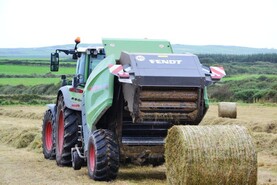Here at home, the cows are milking well, we are on the fourth rotation of the paddocks and the grass is at last taking off, in spite of the fact that we have been a bit miserly with fertiliser. We need to shut up some paddocks for bales, or graze the youngstock.
Milk prices over here are rising faster than an Exocet missile. The terrible three - Brexit, COVID-19 and the Ukraine war - have escalated an already frail market place, which is further acerbated by many 200- and 300-cow herds selling up the minute they get a clear TB test.
Some are highly respected pedigree herds, but in spite of the rising milk price, the current shortage of labour and impending controls on slurry etc, the cost of implementing them is the last straw. Also in the mix is the desire of the next generation for a better lifestyle, rather than working 24/7.
The next generation here are very concerned about rising costs, but I keep trying to persuade them that all milk producers are in the same boat, and for the first time in my life, I can see a very bright future for milk production.
The next generation here are very concerned about rising costs, but I keep trying to persuade them that all milk producers are in the same boat
For far too long, the supermarkets have dictated a base price using their huge buying power. While they it good business practice, some would say it was sharp practice and others would say abuse of power.
Traditionally, milk producers have armour plated themselves with a good layer of despair and despondency to protect themselves from disappointment. I tell them to enjoy the sunshine even if it’s going to rain tomorrow. I can well see milk will be short for the next five to 10 years.
This view was further reinforced when I attended the Dairy Industry Newsletter Conference in London. This was founded years ago by the late, and dare I say, great, Barry Wilson. I initially disliked Barry intensely as he was severely critical of Andrew Dare and his efforts to found our new milk co-operative, Milk Marque, when the market was de-regulated. When I eventually met Barry, I found him incredibly charming, intelligent and well informed and very good company at the bar.
Traditionally, milk producers have armour plated themselves with a good layer of despair and despondency to protect themselves from disappointment
At the conference, we were informed that milk supply both here and in New Zealand is declining (in spite of a rising milk price), Californian milk production is being severely curtailed because the snows which traditionally filled the reservoirs have not melted but evaporated, and hay over there is £380 a tonne.
On top of this, the supply chain is gridlocked with thousands of containers on hundreds of ships waiting outside Shanghai harbour, which is the biggest in the world. When it opens, it will take months to clear this backlog. It would appear that although the EU has stepped forward to support farmers in this crisis, we were informed they intended to make 25% of farmers organic. This will lead to a fall in production.
Sustainability will be the ticket to the table
Years ago, I spent long nights picketing outside milk factories, but I eventually realised that although you may disrupt the supply chain temporarily, this does not change the market dynamics. But now, if they want the milk, they will have to pay for it.
It was great to hear the presentation from the CEO of First Milk Shelagh Hancock, who revitalised the co-op. She has started a vending machine scheme to sell dairy products produced by First Milk farmers.
She also spoke of the Regenerative Farming Scheme. The need for this was echoed by several other speakers, stating that “sustainability will be the ticket to the table.”






 This is a subscriber-only article
This is a subscriber-only article











SHARING OPTIONS: